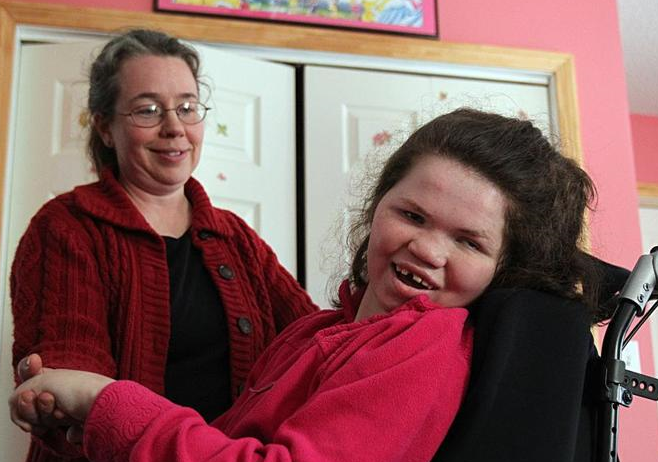Aside from the misleading claim in the article referring to my sister, Terri Schiavo, as being in a persistent vegetative state (PVS), the Boston Globe did a wonderful follow-up story on Haleigh Poutre’s tragic situation.
Back in 2006, Haleigh made national news when her stepfather beat her into a coma. It was just a short time subsequent to this act of violence that her doctors decided this 13-year old had zero chance to recover and her legal guardian went to the courts for permission to remove Haleigh’s life sustaining care.
 In fact, if Haleigh would have happened to survive the removal of the respirator and begin breathing on her own, she would have faced a slow death by dehydration and starvation.
In fact, if Haleigh would have happened to survive the removal of the respirator and begin breathing on her own, she would have faced a slow death by dehydration and starvation.
Fortunately, by the Grace of God, Haleigh showed signs of life before doctors were able to enforce the court’s decision to end her life. From the Boston Globe story, “A new life for Haleigh”:
A day after the state’s highest court authorized the withdrawal of life support so she could “die with dignity,” Haleigh’s eyes opened. She began tracking people’s movements with her eyes, and pointing to toys on command. She defied everyone’s expectations, and while she was never going to return to being the cheerful brown-haired girl who rode bicycles and twirled in dance recitals, she was not, as doctors had predicted, doomed to a life of virtually no awareness.
Despite Haleigh showing signs of improvement and escaping her court issued death sentence, her case yet again illustrates how relatively easy it is, not only for doctors to misdiagnose a patient, but also how little evidence is needed, for the court to approve the removal of life sustaining treatment – this includes food and water, via feeding tubes.
It was for this reason that our non-profit, the Terri Schiavo Life & Hope Network, got involved in Haleigh’s case. In fact, Haleigh’s situation was one of the first cases we got involved in after we began operating as a non-profit in 2005, petitioning, then Governor of Massachusetts, Mitt Romney; making recommendations that the Massachusetts Department of Social Services provide certain safety nets of protection for persons and situations like Haleigh’s.
But this is just one incident that made headline news. Indeed, most of the general public is completely unaware of how much these types of decisions are made every day and how our medical rights have been eroded by laws that have been changed to make it easier to deliberately kill our medically vulnerable. How many of us, for example, understand that basic care, food and water (via a feeding tube) has been reclassified as medical treatment? As a result of this redefinition, feeding tubes can legally be removed from/denied to patients – patients who are neither dying nor do they have any other extraordinary means of keeping them alive – in all 50 states.
Unquestionably, by the number of calls we have received for help over the past nine years, there has been a major shift among a growing number of hospitals operating in our nation today. In this increasing amount of health care rationing climate in which we now live, where doctors decide whether or not a person will live or die based on their “quality of life”, the denial of food and water occurs every single day, across an unknown number of health care facilities. Certainly, none of us will ever know how many “Haleigh’s” out there were never given the opportunity to recover. Not long ago, there was a “do no harm” vow to act in the best interest of the patients, but that has now transformed into doing what’s in the best interest of the hospitals. In short, whatever will financially benefit the hospital.
Haleigh’s case reminds me of Brenden Flynn. In 2002, 18 year-old, Brenden was involved in a fatal automobile crash; physicians essentially gave him a zero chance to have any kind of meaningful recovery. And if he did survive, his day-to-day care would be very costly. Brenden’s parents refused to give the doctors permission to, “put him in a room and let him die”, and instructed them to do whatever they could to help their son. Today, Brenden is married and has a beautiful 2-year old daughter and publicly speaks all over the country about his experience. I often wonder what the state would have done if Brenden lived in Massachusetts and his parents weren’t there to protect him.
Indeed, it is extraordinary families like Brenden’s and the adoptive family now taking care of Haleigh who are the real champions living among us. They don’t see a person with a disability through the lens of our “me first” culture as being too costly, or an inconvenience, but rather as a human person whom they have been blessed with the opportunity to love, to care for, and to protect.
If we don’t do away with this lethal “quality of life” mentality that has taken root in a growing number of minds in our nation today, then people like Haleigh will die along with the countless other vulnerable men and woman, young and old who were never given a chance to be loved.







